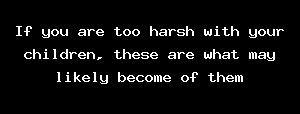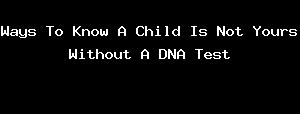profile/4190IMG_20200723_160449_987.jpg
Steph15

If You Are Too Harsh With Your Children, These Are What May Likely Become Of Them
~1.5 mins read
While it is appropriate to discipline and spank children for their wrong deed, there is also need to take a caution in order not to breed a rebel as children.
It is true that parents should not spare the rod and spoil the child but there are certain situation where this notion does not really work. In other words, it is not everything children do they should be beaten or disciplined for.
When you shout on your children or beat them at every slightest provocation or misbehavior, you might not likely be able to handle the consequence of your action in the long run.
If you are too harsh with your children, these are what you may likely get in return as a result of your harshness on them:
1. When you are harsh on them, they may grow up to become bullies. You will just realize that your children treat other children like trash and with disrespect.
In other word, they will see it normal to be harsh with people. Respect will be far from their dictionary.
2. When you are too harsh with your children, they will become very aggressive. The only thing they will understand as a means of settling any difference is by being aggressive. Before you know it, they will become aggressors in their school or wherever they are.
3. When you are too harsh with your children, you should be ready for trouble every time. They will always trace them home to report or square up with you as their parents.
You will always be invited to their schools to settle issues and apologize for their wrong deed. There are times when you will even need to be invited to the police station to write a statement on behalf of your child who had committed an offence either in school or neighborhood.
As parents, you have to strike a balance between training your children and disciplining them.
profile/4190IMG_20200723_160449_987.jpg
Steph15

Ways To Know A Child Is Not Yours Without A DNA Test
~0.8 mins read
The issue of paternity has become a global thing and in most times it comes from the man, so many men deny children that are claimed to be theirs by ladies, it is quite unfortunate that trust does not exist anymore in relationships, regarding that some ladies do cheat on their partner, well sometimes it is quite hard to know if a child really belong to you, but the surest way is through DNA test which is very expensive, So here are 4 other proven ways to go about it.
1. Eye or hair test: everyone has a pattern in which his or eyes is and also the hair, however it is 70 percent sure that a child will have the pattern of the eyes is father has, as commonly believed that the male has a very strong effect on how a child appears.
2. Genetic characters: if you ever did biology it is a very sure thing that some genes from both parents are passed to their offspring, in this case there will be some physical traits with the parent which the child will also carry
Advertisement

Link socials
Matches
Loading...
